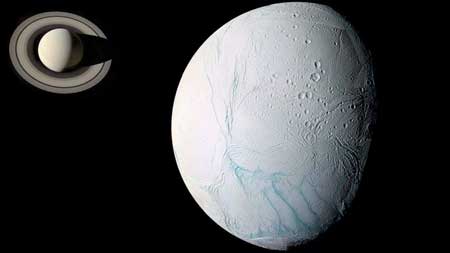| Jul 06, 2018 |
Could one of Saturn's moons support life?
|
|
(Nanowerk News) For years, the scientific community has been exploring the galaxy’s far reaches, searching for exoplanets with any signs of alien life. The whole time, the answer might be right here in our very own solar system.
|
|
In 2017, NASA provided new evidence that one of the two most likely places to find life beyond Earth was Saturn’s Enceladus. When it comes to potential habitability, this ocean-bearing moon has almost all of the key ingredients for life as we know it.
|
 |
| Enceladus
|
|
A study published in the journal Nature ("Macromolecular organic compounds from the depths of Enceladus") says that Enceladus satisfies all the basic requirements for hosting life. A research team led by Dr Frank Postberg of Heidelberg University in Germany based its findings on data gathered following 13 years of observations by NASA spacecraft Cassini.
|
|
This isn’t the first time Cassini has detected organic molecules on Enceladus. But it’s their size that’s the real game changer. Earlier molecules were lightweight, but these fragments are much larger. Such large molecules can only be created by complex chemical processes, including those connected to life. While studying Saturn and its moons, Cassini revealed some of Enceladus’ secrets along the way. It discovered an enormous ocean of water below its icy crust.
|
Complex organic molecules offer tantalising hint of a habitable environment
|
|
The researchers found evidence of carbon-rich substances formed in the heart of Enceladus. These compounds are believed to have formed in reactions between water and warm rock at the base of the moon’s subsurface ocean. “These huge molecules contain a complex network often built from hundreds of atoms,” Dr Postberg, who is also one of the study’s authors, told the ‘BBC’. “This is the first ever detection of such complex organics coming from an extraterrestrial water-world.”
|
|
These types of compounds have only previously been found on Earth. They aren’t a sign of life, but their presence suggests Enceladus could play host to living organisms. “They are a necessary precursor to life,” he added, “[but] we currently cannot tell if these organics are biologically irrelevant or signs of prebiotic chemistry or even life.”
|
Enceladus: the best candidate for supporting life
|
|
“Previously it was unknown whether complex organic chemistry happens on Enceladus – and now we know,” explained Dr Postberg in the United Kingdom’s ‘Independent’. “It is of course one of the biggest science questions there are – extraterrestrial life: yes or no – and here is a spot where we can check. We have a habitable environment there and we have the means to probe it to find whether there is actual life or not.”
|
|
In 2017, Cassini’s mission to gather data on Saturn ended when it crashed and burned in the planet’s atmosphere. This abruptly ended the joint mission between NASA, the European Space Agency and the Italian Space Agency. So what now? “The next logical step,” concluded Dr Postberg in his ‘BBC’ interview, “is to go back to Enceladus soon with a dedicated payload and see if there is extraterrestrial life.”
|

